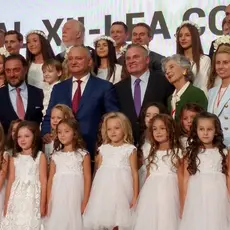Last year, a slew of American Religious Right activists traveled to Moscow to take part in an international conference called “Large Families and the Future of Mankind.” The conference was funded by top allies of Russian President Vladimir Putin and was organized by the Illinois-based World Congress of Families (WCF ended its official role in the event after the U.S. placed sanctions on some of its funders, but was still clearly the main organizing force behind it.)
The fact that the conference was dedicated to “large families” is important. In a new report for Political Research Associates, Cole Parke exposes how WCF has worked with Russia’s government to exploit fears of a European “demographic winter” and push for policies restricting abortion and LGBT rights. Parke illustrates that behind the “demographic winter” warning is a “cynical manipulation of racial resentments” — not the fear that the country’s population is dropping but that Russian identity might be “redefined as something other than White and Orthodox.”
WCF’s influence at the U.N. relies heavily on its longstanding ties with Russia, one of the five permanent members on the U.N. Security Council. Carlson’s work on the ”demographic winter”—the idea that abortion, birth control, homosexuality, feminism and other ”unnatural” deviations have led to dangerous population decline and a crisis for the ”natural family”—has proven to be particularly effective in garnering favor with Russia’s conservative leadership.
Carlson argues that declining birth rates threaten the decline of civilization—Western civilization. As researcher and journalist Kathryn Joyce puts it, “The concern is not a general lack of babies, but the cultural shifts that come when some populations, particularly immigrant communities, are feared to be out-procreating others.” Put another way, the demographic winter thesis cultivates racism and xenophobia in support of exclusionary “natural family” policies. A main objective of the WCF’s demographic scare tactics is to convert nationalism into natalism, and thereby mobilize a larger anti-abortion, “natural family” base. (Natalism prioritizes human procreation, including public policies that reward birthing children.)
This perspective is commonplace among WCF and its affiliates. Following WCF’s 1997 congress in Prague, Cathy Ramey, associate director of the U.S. anti-abortion organization Advocates for Life Ministries, explained what she’d learned: “As native citizens reject marriage and child-bearing, other non-native groups will simply move in and replace the historic population.” Speaking at WCF V, John Mueller, a researcher at the Ethics and Public Policy Center—a neoconservative think tank in Washington, DC, argued that “fertility would rise and remain above the replacement rate, not only in the United States but also most other countries, by ending legal abortion.”
In Russia and other parts of Europe, a combination of population anxiety and growing anti-Muslim, anti-immigrant sentiment has offered WCF a favorable political context in which to advance its anti-abortion, “natural family” agenda. Carlson and his network have fanned the flames of “demographic winter” anxieties throughout the region.
In June 2011, WCF hosted the Moscow Demographic Summit, describing it as the “world’s first summit to address the international crisis of rapidly declining birthrates.” More than 500 people attended, including Patriarch Kirill, head of the Russian Orthodox Church; Russian First Lady Svetlana Medvedeva; members of the Russian Duma; and a host of right-wing American scholars and activists.
Within two weeks of the event, President Medvedev—whose wife, Medvedeva, had recently teamed up with the Russian Orthodox Church on a new anti-abortion campaign—signed a law requiring abortion providers to devote 10 percent of any advertising to describing the dangers of abortion to a woman’s health, and making it illegal to describe abortion as a safe medical procedure. This was the first new legislative restriction placed on abortions in the country since the fall of Communism.
Four months later, in October 2011, the Russian Duma passed a law further restricting abortions to within the first 12 weeks of pregnancy, with exceptions for cases up to 22 weeks in instances of rape or medical necessity. The new law also tacked on a mandatory waiting period of two to seven days before an abortion can be performed, a common tactic used by anti-abortion activists in the U.S.
Parke explores how WCF exploits nativist and nationalist fears in order to push restrictions on reproductive rights and LGBT equality in its work in Africa and at the United Nations as well. You can read the full report here.





